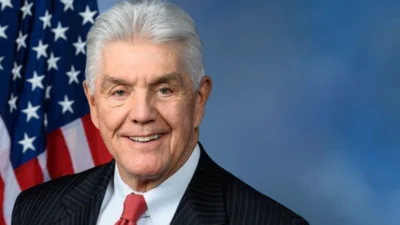Mr. Chairman, I am pleased that we are holding this hearing on Social Security today. Social Security is a bedrock of American Society. In nearly 78 years Social Security has weathered 13 recessions and during that time it has always paid benefits in full and on time. But Social Security will face challenges in the future. In roughly a quarter of a century we know that because of the baby boom generation retirement, we have to deal with the fact that we have more people retiring and fewer people working to pay in benefits.
With all due respect to our distinguished panel, I’m concerned that we don’t have all the right experts here today to talk about what is clearly the biggest challenge facing the new Social Security Commissioner - budget cuts that have left the Social Security Administration without enough resources to serve the public the way they want to and the way they should.
Americans have paid for Social Security with their weekly payroll tax contributions, which are deposited into the Social Security Trust Funds. By law, those worker contributions can only be spent on benefits and on the cost of administering those benefits, yet this Congress has prevented SSA from spending what is needed in order to provide Americans with the service they have paid for. Even before the budget cuts, Social Security was extremely efficient, spending less than 1 penny on program administration for every dollar it spends paying the benefits earned by American workers.
Mr. Chairman, as I discussed with you earlier this week, I regret that we are moving forward with this hearing without inviting some key additional perspectives.
I think there are some glaring omissions on the witness panel. The Acting Commissioner of Social Security, who is in charge of the entire agency, is not here. The employees who serve our communities in local field offices are not here. We do not even have represented the views of our fellow Americans who worked and paid into Social Security and are now receiving the benefits they’ve earned.
As much as outside reviewers like the Inspector General and the Government Accountability Office have to offer - and they certainly have a place at the table - we are missing crucial voices at this hearing.
I’d like to enter into the record a letter I sent to the Chairman registering my concerns about the absence of broader representation on our panel of witnesses today.
Because SSA leadership, front-line workers and beneficiaries are not here to explain the consequences of three years of budget cuts, and the resulting challenges they pose, I want to walk us through some charts so that everyone can understand the consequences of these budget cuts.
What I think you’ll see is that it really isn’t a matter of being more efficient, or choosing different priorities. Across-the-board, SSA’s service to Americans -- service that they have paid for with their hard-earned dollars -- is getting worse and worse, even while the agency’s employees keep working as hard as they can.
I want to start by noting that the number of Americans receiving Social Security is growing steadily, even as SSA’s budget declines.
Yet Social Security’s operating budget, which Congress provides through the annual appropriations process, has been cut for three years in a row, and is now lower than it was in 2010.
These budget cuts directly affect SSA’s ability to do its work. Nationwide, SSA has lost more than 1 out of every 10 staff who serve the public in its local offices. The agency has generally been unable to afford to replace workers who leave or retire. As a result, staff shortages are very uneven across SSA’s local field offices, with some states having lost 15 or even 20 percent of local office employees.
Even though SSA makes strategic investments in technology and automation that have yielded steadily increasing productivity among its employees, these investments cannot fully make up for the staff loss. As a result, each employee is faced with a higher caseload of individuals needing assistance from SSA. Waiting times have gone up accordingly.
Even SSA’s 800-number telephone service has deteriorated, with waiting times double what they were in 2009.
When we look at waiting times for disability appeals hearings - a problem than has been the subject of bipartisan concern on this Committee and in fact across the Congress -- the picture is especially discouraging. For several years, Congress provided additional funding so that SSA could work down its backlog of disability hearings and reduce waiting times for severely injured and ill people.
You can see on this chart how those investments paid off, with waiting times falling from nearly 500 days at the start of fiscal year 2009, to a low of just under 350 days at the start of fiscal year 2011.
Unfortunately, that progress is being undone, as even one of SSA’s most high-priority, high-profile efforts is now experiencing the harm of the budget cuts SSA has sustained since 2010. Waiting times for hearings have risen steadily since their low in the fall of 2011.
Finally, on top of all the other service declines I have just shown, SSA is accumulating an ever-growing backlog of unprocessed work. This chart shows the backlog of uncompleted work that SSA must perform to ensure that current Social Security recipients receive accurate and timely payments. It would take SSA more than 7,500 work years to clear out this accumulated backlog.
The unprocessed work includes things such as changing beneficiary addresses or payment instructions, recouping overpayments, issuing underpayments, conducting background checks on “representative payees" - individuals who receive benefits on behalf of a mentally disabled beneficiary or other vulnerable persons.
Finally, if we are serious about preventing waste, fraud, and abuse in Social Security, the first step is to provide the full investment in proven strategies that reduce waste, fraud, and abuse which was agreed to as part of the Budget Control Act.
In the Budget Control Act, Congress and the President agreed to a level of targeted investments in eligibility reviews at SSA. This type of “program integrity" work ensures that Social Security is only paying people who are fully eligible for benefits, and is paying them the right amount. These reviews save up to $9 in benefits for every $1 spent conducting the reviews. Yet Congressional funders have failed to live up to their commitment, and both this year and last year blocked full funding for eligibility reviews.
As a result, taxpayers have lost billions in benefits paid to individuals who no longer meet the eligibility criteria to receive benefits. As you can see, I’m frustrated. This Congress is being penny-wise and pound-foolish. Congress should allow SSA to provide the level of service that the American people have paid for - nothing more, nothing less.
Mr. Chairman, I am pleased we are holding a hearing to discuss the challenges facing SSA and I look forward to hearing from our two witnesses. But at the same time, I am disappointed at the absence of additional key voices. Without having all the experts we should, we are getting an incomplete picture of the challenges facing Social Security.








